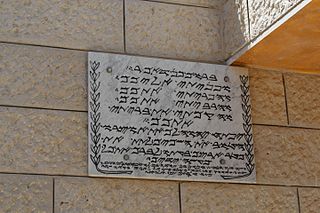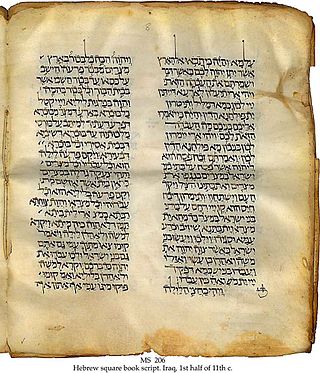
Samaritanism is an Abrahamic, monotheistic, and ethnic religion. It comprises the collective spiritual, cultural, and legal traditions of the Samaritan people, who originate from the Hebrews and Israelites and began to emerge as a relatively distinct group after the Kingdom of Israel was conquered by the Neo-Assyrian Empire during the Iron Age. Central to the faith is the Samaritan Pentateuch, which Samaritans believe is the original and unchanged version of the Torah.

The Torah is the compilation of the first five books of the Hebrew Bible, namely the books of Genesis, Exodus, Leviticus, Numbers and Deuteronomy. The Torah is known as the Pentateuch or the Five Books of Moses by Christians. It is also known as the Written Torah in Rabbinical Jewish tradition. If meant for liturgic purposes, it takes the form of a Torah scroll. If in bound book form, it is called Chumash, and is usually printed with the rabbinic commentaries.

A targum was an originally spoken translation of the Hebrew Bible that a professional translator would give in the common language of the listeners when that was not Biblical Hebrew. This had become necessary near the end of the first century BC, as the common language was Aramaic and Hebrew was used for little more than schooling and worship. The translator frequently expanded his translation with paraphrases, explanations and examples, so it became a kind of sermon.

The Samaritan Pentateuch, also called the Samaritan Torah, is the sacred scripture of the Samaritans. Written in the Samaritan script, it dates back to one of the ancient versions of the Torah that existed during the Second Temple period, and constitutes the entire biblical canon in Samaritanism.

Targum Jonathan, otherwise referred to as Targum Yonasan/Yonatan, is the official eastern (Babylonian) targum to the Nevi'im ("prophets").

Targum Pseudo-Jonathan is an Aramaic translation and interpretation (targum) of the Torah (Pentateuch) traditionally thought to have originated from the land of Israel, although more recently a provenance in 12th-century Italy has been proposed.

Chumash is a Torah in printed and book bound form as opposed to a Sefer Torah, which is a scroll.

Joseph Herman Hertz was a British Rabbi and biblical scholar. He held the position of Chief Rabbi of the United Kingdom from 1913 until his death in 1946, in a period encompassing both world wars and the Holocaust.
The Samaritans are an ethnoreligious group of the eastern Mediterranean region, originating from connection with ancient Samaria.
Hebrew Bible English translations are English translations of the Hebrew Bible (Tanakh) according to the Masoretic Text, in the traditional division and order of Torah, Nevi'im, and Ketuvim. Most Jewish translations appear in bilingual editions (Hebrew–English).
Samaritan Aramaic, or Samaritan, was the dialect of Aramaic used by the Samaritans in their sacred and scholarly literature. This should not be confused with the Samaritan Hebrew language of the Scriptures. Samaritan Aramaic ceased to be a spoken language some time between the 10th and the 12th centuries, with Samaritans switching to Palestinian Arabic as their vernacular language.
Jewish commentaries on the Bible are biblical commentaries of the Hebrew Bible from a Jewish perspective. Translations into Aramaic and English, and some universally accepted Jewish commentaries with notes on their method of approach and also some modern translations into English with notes are listed.
Jewish printers were quick to take advantages of the printing press in publishing the Hebrew Bible. While for synagogue services written scrolls were used, the printing press was very soon called into service to provide copies of the Hebrew Bible for private use. All the editions published before the Complutensian Polyglot were edited by Jews; but afterwards, and because of the increased interest excited in the Bible by the Reformation, the work was taken up by Christian scholars and printers; and the editions published by Jews after this time were largely influenced by these Christian publications. It is not possible in the present article to enumerate all the editions, whole or partial, of the Hebrew text. This account is devoted mainly to the incunabula.
Shnayim mikra ve-echad targum, is the Jewish practice of reading the weekly Torah portion in a prescribed manner. In addition to hearing the Torah portion read in the synagogue, a person should read it himself twice during that week, together with a translation usually by Targum Onkelos and/or Rashi's commentary. In addition, while not required by law, there exists an Ashkenazi custom to also read the portion from the Prophets with its targum.

Sifrei Kodesh, commonly referred to as sefarim, or in its singular form, sefer, are books of Jewish religious literature and are viewed by religious Jews as sacred. These are generally works of Torah literature, i.e. Tanakh and all works that expound on it, including the Mishnah, Midrash, Talmud, and all works of halakha, Musar, Hasidism, Kabbalah, or machshavah. Historically, sifrei kodesh were generally written in Hebrew with some in Judeo-Aramaic or Arabic, although in recent years, thousands of titles in other languages, most notably English, were published. An alternative spelling for 'sefarim' is seforim.

Selah, Salah or Sala or Shelah is an ancestor of the Israelites and Ishmaelites according to the Table of Nations in Genesis 10. He is thus one of the table's "seventy names". He is also mentioned in Genesis 11:12–15, 1 Chronicles 1:18–24, and Luke 3:35–36.
The Tanakh or Tanak is the Hebrew Bible.
Torah refers to the first five books of the Hebrew Bible, and the law derived from them.
Ancient Hebrew writings are texts written in Biblical Hebrew using the Paleo-Hebrew alphabet before the destruction of the Second Temple in 70 CE.








